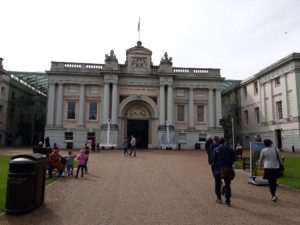On Friday 5 July PTUC convened a symposium on ‘New Perspectives on Coastal and Maritime Communities.’ Hosted in the atmospheric Boardroom of the Royal Museums Greenwich, the aims of the symposium were to take stock of the current state of research in this area, to continue our development of networks between researchers, academics, practitioners, and museums, and to inform an upcoming conference planned for Autumn 2020. The symposium brought together scholars from across the globe, at many different stages of their careers.
In the morning, three intriguing presentations touched on themes including social interactions and community formation. Manikarnika Dutta (University of Oxford) presented ‘The History of Sailors Home in Nineteenth-Century India’, examining how such philanthropic institutions, mainly in Calcutta and Bombay, revealed changing concepts of masculinity and ways that altruistic organizations could structure social relations. In some ways, controlling the white sailors in the imperial context took on a heightened importance, as the image and reputation of the sailors affected that of the ruling classes. Rachael Johnson (Kingston University) also touched on the issue of social boundaries with her paper, ‘Rush into the Sea: Freedom, politeness and the first seaside resorts.’ Johnson revealed to us how rules and practices coded behaviour at resorts such as Margate during the long eighteenth century, yet the unique attributes of the seaside environment tended to erode or circumvent the constraints of polite society. Laura Rowe (University of Exeter) analysed issues of memory and place with her presentation, ‘Communities of Mourning: Maritime communities and the commemoration of the Great War.’ Rowe discussed competing priorities and needs that had to be taken into account as authorities worked to place and design memorials for those lost or buried at sea. The memorials at Portsmouth, Chatham, and Plymouth became ‘sites of memory’ where private and public memory intersected.
After lunch, this theme of place and identity remained prominent in a trio of papers on three very different coastal communities. Lasse Heerten (University of Bochum) presented ‘Portal of Re-Urbanization: The Free Port of Hamburg and the Transpatial Making of a Modern Port City, c. 1880-1910.’ Heerten eschewed a tendency in the global historiography to ‘pass through’ ports, as nodes of flows and transmissions, and instead looked at the port in its own right, as a self-enclosed organism. In the case of Hamburg, the port merged urban and national space. Cathryn Pearce (University of Portsmouth) used folklore and legend with ‘Pirate Wreckers and False Lights: Migratory legends and a coastal sense of place.’ Pearce’s examination of tales of eighteenth and nineteenth-century wrecks in the Cornish coasts demonstrated how a ‘sense of place’ was frequently rooted in narration. In our final presentation, Andreas Linderoth (Swedish Naval Museum, Karlskrona) brought us into more contemporary issues with his analysis of ‘The Naval City Karlskrona in the Balance—the 1990s.’ Linderoth used newspapers to trace how the city maintained a distinct identity during the threat of declining naval investment after the end of the Cold War.
In our closing discussion, led by our convenors Brad Beaven (University of Portsmouth), Quintin Colville (Royal Museums Greenwich), and Mathias Seiter (University of Portsmouth), we spoke about the papers’ many congruities: themes of social control; the coast or port as both a borderland and a contact point; and the usefulness of such international perspectives and studies. In addition, we brought up additional topics that might inform next year’s conference, including migration and movement, labour, and environmentally-themed scholarship. Further suggestions were made regarding ways to bring the conference to a broader audience, such as a workshop on public outreach, and the continued collaboration between museums and universities. Several of the attendees then visited the Caird Archive and Library. There, Graham Thompson guided us on how we might use the library for future research and shared a delightful display of original nineteenth-century documents about women at sea.
The conversation continued long after, as many of the participants ended the evening by raising a glass at the historic Trafalgar Pub on the River Thames. After a day full of new research, new insights, and new colleagues, we are looking forward to the 2020 conference!











Comments are closed.